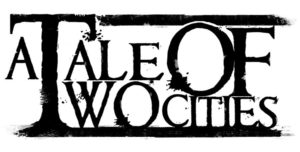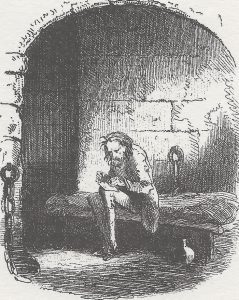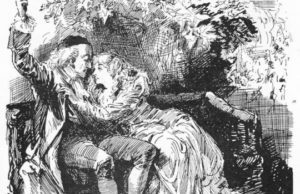What is life? Scientists define the four characteristics of life as the ability to reproduce, the presence of DNA, the strength to extract/ convert energy into a useful substance, and the capacity to sense and respond to changes in surroundings. Merriam-Webster maintains that life is”the sequence of physical and mental experiences that make up the existence of an individual”. Neither of these definitions encompass the full meaning of life when referring to the human being, a spiritual creature. Life is not simply physical existence. In fact, no human answer can fully define the word. Philosophers, scientists, all of humanity have tried in vain for years to put “life” in a box; to make it a tangible, understandable substance.
Who determines the patent for a new invention? The inventor, of course. Who, then, has the power to define life? If there is a Creator, what life is can only be determined by Him. If there is no Creator, then life is essentially nonexistent because it is merely a figment of the imagination, a whim lacking purpose or fulfillment. Consequently, life cannot be fully defined at present time. However, the closest measure individuals have to interpret life is equation to other ideas. Life can be discovered to a minimal extent in such elements as purpose, love, health, freedom, or joy. This essay takes three aspects of life- freedom, purpose, and love- and applies them to A Tale of Two Cities (1859) by Charles Dickens.

A Tale of Two Cities was originally published as a serial novel. Making the best use of historical fiction, Dickens portrays the horrors of the French Revolution with accurate detail. The book begins with Jarvis Lorry, en route to Paris- heading to meet “the Mam’selle” (Dickens,19), Lucie Manette. His trusted messenger, Jerry, approaches the stagecoach with a message concerning Lucie, and Mr. Lorry replies only, “Recalled to life”. He is referring to Dr. Manette, Lucie’s father, who had been imprisoned for the past 16 years. His daughter is under the impression that he is dead. When she realizes that he is indeed living, and free, she immediately accompanies Mr. Lorry to the wine shop of Mr. Defarge, where her father blankly taps pegs onto shoes. After bringing him home, a long journey back to health ensues, and when the reader next meets Dr. Manette in the courtroom during Charles Darnay’s trial, he has returned to good health and respectability. Truly, “Recalled to Life” seems an accurate phrase to describe Dr. Manette’s re-entrance into society.
Yet critics hold that Dr. Manette was not recalled to life, claiming that the life he led post-prison lacked quality. In the context of freedom, purpose, and love- three key aspects that constitute life- was Dr. Manette truly “recalled to life”?

Freedom: possibly the most sought-after feature that life can give. Dr. Manette’s release from prison definitely added to the quality of his life. Compared to sixteen years caged in the Bastille, even the poorest of situations would hold an advantage. A comfortable living, respect in society, and a daughter’s company were a heaven of opportunity- at first glance. Though he appeared to be unfettered, Dr. Manette’s mind was still chained by trauma. Indeed, he exhibited numerous features of the illness now recognized as PTSD. When emotionally triggered, the Doctor would relapse into a blank state, gravitating to his shoemaker’s bench from prison, and staying there for hours at a time. Though this state was not constant, triggers to his trauma remained: one of them being his son-in-law, who happened to be the son of Marquis who caused the Doctor’s suffering. In the context of freedom, did the doctor truly live after his release from prison, or did he simply come back to a world filled with the haunts of his former chains?
Another key to life is found in purpose: a reason to exist. Undoubtedly, the Doctor had motivation for life in his daughter. Lucie nursed her father to health: indeed, she is the reason he rose out of near-insanity in the first place. She was all gentleness, kindness, and goodness. She gave the old man purpose, hope for life. However, the Doctor had lost sixteen years of his life, and his daughter’s life, when he was imprisoned. Indeed, he had almost no recollection of those years, even though they hung over him like a curtain that would smother him for hours at a time when occasionally they deluded his mind. Worse than losing the early years of his daughter’s existence was the loss of the last best years of his wife’s life. Was the purpose that came by Lucie enough to overcome the wasted years without her?

The closest synonym to life is love. In fact, it is probably what kept Dr. Manette in this world. His daughter, Lucie, gave freely of the love he was starving for over the sixteen lonely years. But does love truly conquer all? Does love conquer lost years of loneliness, and a haunted future at the merciless hands of trauma?
Was the doctor truly “recalled to life”, as his friend would have the observer believe? Does physical freedom mean anything when the mind is chained? Does purpose have a place in a horizon clouded by wasted years? Is love enough to erase all the evils of the past, and bring life out of oblivion?
The answer to that question is one that you, my good reader, shall have to discover for yourself.
You can buy the DoverThrift version of this classic, thought-provoking book here.